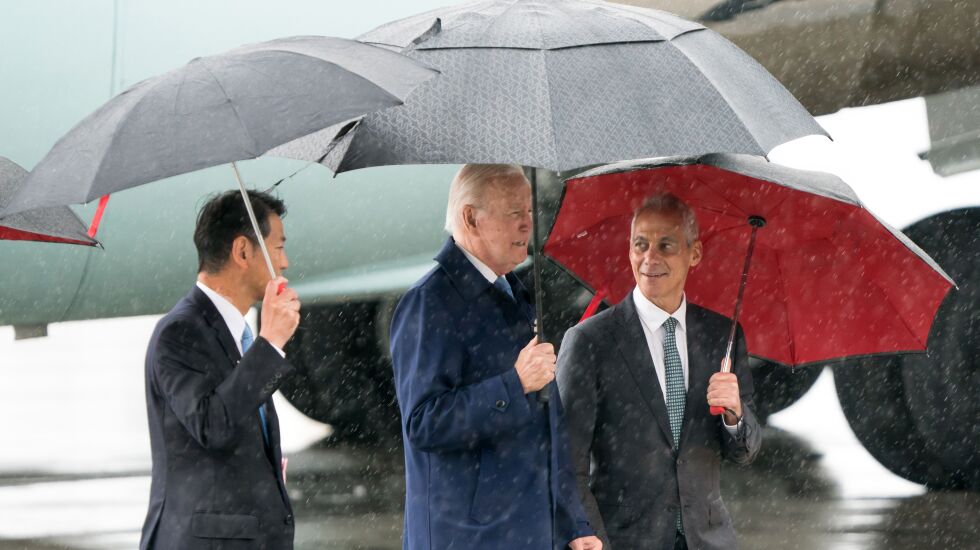
WASHINGTON — When I talked to Rahm Emanuel, the U.S. Ambassador to Japan, near midnight Wednesday my time — Thursday afternoon in Japan — he was at the Marine Corps Air Station in Iwakuni, waiting for President Joe Biden to land in Air Force One.
Biden is in Japan for the G7 Hiroshima Summit — a meeting of the nations with the biggest economies.
The “Group of Seven” — nicknamed the G7 — consists of the U.S., Canada, France, Germany, Italy, Japan and the United Kingdom.
The summit is dealing with, among other things, the Ukraine war, with the G7 members installing more sanctions to try to financially starve the Russian war machine; economic security and the threat from China; and nuclear non-proliferation and nuclear disarmament.
Hiroshima was destroyed when, at 2:45 a.m. on Monday, Aug. 6, 1945, the U.S. dropped the world’s first atomic bomb.
The occasion of our brief interview — before Emanuel greeted Biden on the tarmac — was to discuss a deal Emanuel put together where he got IBM and Google to, combined, put up $150 million for the University of Chicago and the University of Tokyo to study ways to make more powerful quantum computing.
What this means for the city of Chicago is this, Emanuel said: “This puts Chicago in the lead in the field of quantum. The University of Chicago is now one of the premier schools worldwide in quantum research, which will pay dividends for generations economically.”
The emerging field of quantum computing, according to the Department of Energy, “may revolutionize our ability to solve problems that are hard to address with even the largest supercomputers.”
The agreements between the schools will be formalized at the G7 on Sunday, with, among others, the U. of C. president, Paul Alivisatos, in attendance.
Emanuel, the former Chicago mayor, won Senate confirmation for this post on Dec. 18, 2021, shortly after moving to Tokyo to start a new chapter in a career where, before landing in City Hall and serving two terms as mayor, he was a House member and former President Barack Obama’s first chief of staff.
The origins of this new partnership stem from a lunch Emanuel had with the University of Tokyo president, where Emanuel learned about that school’s quantum computing program.
Emanuel was aware from his time as mayor that the U. of C. was already a leader in the area of quantum information and technology, so he asked the Tokyo school president, “What do you think about a partnership?”
After that, Emanuel said he reached out to Tom Pritzker, whose family charities have heavily supported research at the U. of C. — in 2019 the Pritzker Foundation pledged $100 million for the new Pritzker School of Molecular Engineering, which has made quantum technology a focus.
To get to the bottom line, Emanuel said he promised to find “new funding” — that turned out to be IBM and Google — to make the quantum computing collaboration a reality.
IBM is giving, over 10 years, $100 million to develop — according to the U. of C. — “the world’s first quantum-centric supercomputer.” Google is putting up $50 million to, again according to the U. of C., “support quantum computing research and to help train the quantum workforce of the future.”
“In our faith, we would call it matchmaking,” Emanuel told me about his role in taking this project from a concept to raising the $100 million and $50 million to make it happen.
Most of the U. of C. work stemming from this collaboration will be centered at the William Eckhardt Research Center, at 57th and Ellis. The U. of C. is part of an evolving quantum research ecosystem, with the network including the Argonne and Fermi national labs, based in the Chicago suburbs; the University of Illinois, Urbana-Champaign; Northwestern University; and the University of Wisconsin-Madison.
On Hiroshima
I asked Emanuel about the impact of discussing nuclear weapons in Hiroshima.
“Obviously, the setting itself speaks to nuclear non-proliferation, but it also speaks to deterrence. … I think the main thing to think about,” said Emanuel, who has been to Hiroshima four times, is the city “has multiple meanings, not a singular meaning.”







